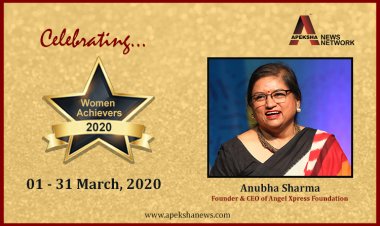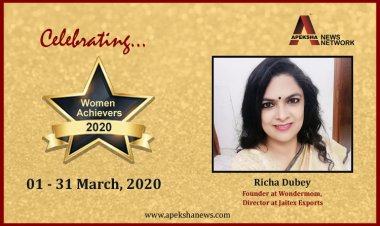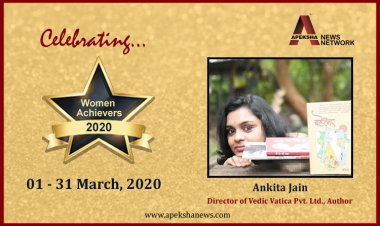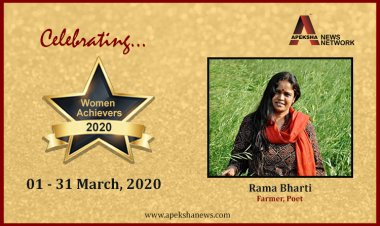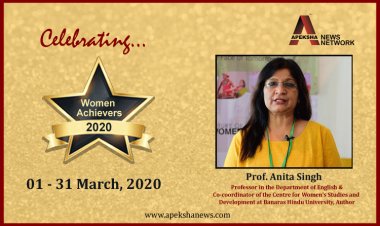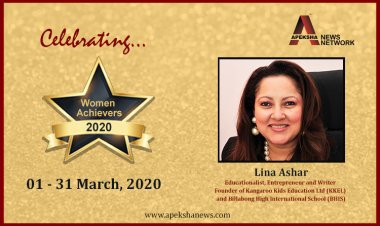“We need books that heal.” - Richa Jha, Founder and Publisher of Pickle Yolk Books
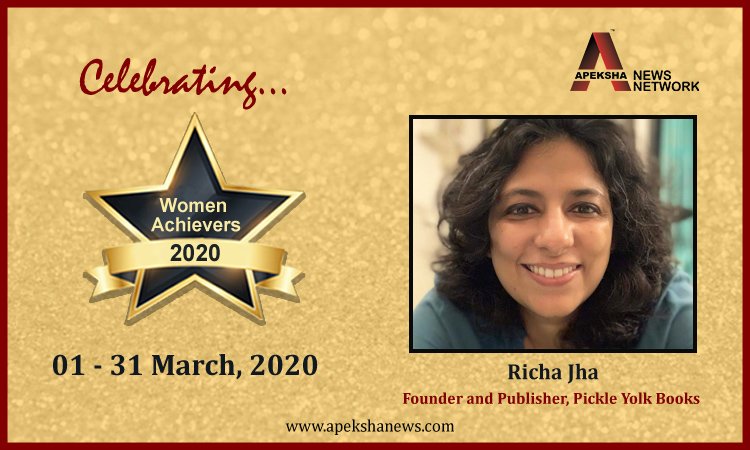
Richa Jha is the founder of Pickle Yolk Books, an independent publishing house, a two-time finalist as the Publisher of the Year at the Publishing Next Industry Awards and entered the Limca Book of Records. As an author, many of her fifteen picture books have won national and international recognition. These range across platforms like the Comic Con, South Asia Book Award, USA, the White Raven, Publishing Next, Crossword and Neev, to name a few.
She hosts the country’s first online critique platform and runs the only website dedicated to reviewing Indian picture books, known as Snuggle with Picture Books. Richa has worked as an editor for children’s books at the New Delhi based Wisdom Tree, and the Kids section editor at Time Out Delhi. She is also an active member of the kidlit community, SCBWI and IBBY, and regularly attends conferences, webinars and book fairs, including Bologna and Frankfurt.
Apeksha News Network had an exclusive interaction with the picture book enthusiast Richa Jha, wherein she talks about publishing industry and gives us insights on issues faced by authors and publishers. Check out the excerpts!
Tell us something about your life before Pickle Yolk Books.
My previous roles as a freelance writer, columnist, teacher, critic, editor spanning the last two decades seem to have been preparing me for my life at Pickle Yolk in a subtle or overt way.
How has the journey been so far for you as an Entrepreneur?
Choppy, challenging, delightful and rewarding, all rolled into one. On most days, I wake up wondering if this is the day when I decide to hang up my boots, but each such day throws up unexpected joys in one form or another, and Pickle Yolk survives to see yet another beautiful day!

Amidst strong competition in the publishing market, how does Pickle Yolk Books stand distinguished?
I would like to believe that it is our deliberate persnicketiness on every aspect of the printed book, which includes exceptional writing, illustrations and depth of handling a wide range of subject matters for young children, willingness to take on bold and dark themes with as much ease as a light, crackling one, an unhurried approach to book making, the excellent production values, and an unwillingness to compromise on any is what gives us that edge.
What is the biggest struggle of a publisher today in India?
Every trade publisher in India, big or small, is struggling with ways of reaching the end user and widening the existing readership base. Despite being a $6.7billion industry, its distribution channel remains ad hoc, whimsical and not streamlined. In addition to all this, when seen in conjunction with the shrinking available physical retail space and dwindling review options in the print media, it may seem like sounding the death knell for the trade print books, with the shift of the sale dynamics now disproportionately to the online space, the publishers feel more in control. The books sell as little or as widely as the social media takes them in various forms – direct promotion, word of mouth, blog reviews, customer ratings and so on, which is both liberating and limiting.
What is the biggest struggle of an author/writer/novelist today in India?
I am not sure if I am in a position to speak for all writers across all age groups and genres because the struggles of one may not be relevant to the other. But let me try and list out some that are relevant to the authors writing for children in India. Their struggle includes ambiguity and lack of transparency within the industry on following standard practices with regards to royalties; not being accorded the seriousness or recognition even within the larger trade publishing industry that writing for children deserves. The fact is that we mostly find ourselves lower down in the writerly hierarchy; a reluctance and indifference among the parents of young children, or teenagers in seeking out and buying books by Indian writers; not spotting their titles on the retail bookshelves because of the very little space earmarked for children’s literature at most places; having to contend with doing book promotions without being adequately or not compensated, the struggle with self to throw oneself out there before public eye because most writers still prefer their solitary writing lives to one of attention or spotlight!

Literature plays a huge role towards the growth of the country, considering culture, youth, etc. What do you feel that what kind of literature India needs currently?
We need books that question the status quo, and books that hand hold the reader through their personal-questioning journeys too! We need words that make us feel empathy towards the others around us. We need books that allow us the magic of imagining and dreaming. And we need books that heal.
As readers, we have gotten caught in the trap of easy, quick-fix and formulaic reads that lack depth or enriching insights into the human nature and its conundrums.
eBooks have been in trend. Is it a pro or a con for the literature industry?
I see it as a pro. The more ways we create for the written word to get to the end user, the more we spread the power of words. Given the easy accessibility and location agnostic nature of eBooks, many more people are able to access the books.

Social media tends to make everyone a writer or a poet. How far a person who has good follower base can be a successful author? How far the social media follower base is a criterion for choosing the manuscript?
There is a growing trend of publishing celebrities because of their already established fandom. I have a mixed reaction to that bordering more on disdain. While some of their memoirs or stories are powerful and inspiring, I do have my reservations about signing on people only because of their social media presence. That, without a well-written, well-edited book lacking in substance, is useless and the readers will be quick to call you out on it.
But there is a flip side that cannot be ignored. With the alarming rate at which the physical retail space is shrinking, and how most of the sale now is online, having a preestablished strong social media presence helps with discoverability of the title. However, basing an acquisition solely on that will lead to an overall dumbing down of literature in the country, signs of which are already showing.
What barriers have you faced, as a woman, in becoming successful in your field? How did you overcome them?
I can’t think of any aspect of my publishing journey so far where I have been at a disadvantage because of my gender. I have felt equally at ease and respected interacting with the trade distributors, which is almost entirely a male bastion in India, as I do with say, the specialized, boutique retailers of children’s books. As a matter of fact, I don’t allow my mind to think along those lines at all. At the end of the day, what matters is what one is creating for the world to see. Good work will always find respect.
Literature is an important part of society. Do you think the existing programs introduced by the government for the support of the publishing industry needs enhancement? Any suggestions to the government?
Though the government is the largest publisher in the country, if we look at their entire printed range, combing academic and general trade, it is frustrating to see not much support coming to the publishing industry from the government. While about 70% of the industry is educational/academic publishing, it the much smaller trade publishing that remains largely ignored. There is no clear blueprint for the industry, no concrete or effective anti-piracy laws, and nor is there any defined national book promotion policy. There is no transparent system for the government offloading any small or sizeable percentage of the published titles’ distribution. The public libraries are in the sorriest state ever, so there too the state support is negligible. In fact, many publishers in the government’s procuring books have reported widespread corruption. The GST-related policies specific to publishing and the ancillary input services have made things more difficult for the already burdened slim-profit-margin industry.
The one positive move that has happened is making the issuance of ISBNs totally online now. While the initial several months of this transition from manual to online was fraught with complications, I now do see it running smooth and swiftly enough. The strongest need of the hour, however, is getting an official and authentic public data consolidation out for the industry - for numbers, sales volumes, turnover - which ideally should be coming out from the government. And this is where the ISBN statistics could be the ablest tool.
What main change would you like to see for young girls in the next generation?
Zero gender pay gap, a work environment that doesn’t encourage unnecessary long (but unproductive) work hours, a quick redressal of all and any workplace harassment complaints, and a level-playing field that doesn’t disadvantage a person because of her looks, age, impending marriage, childbirth or whatever.

List down your favorite top 5 must read books for literature lovers.
- The Bluest Eye by Toni Morrison
- The Glass Palace by Amitav Ghosh
- South of the Border, West of the Sun by Haruki Murakami
- Half of a Yellow Sun by Chimamanda Ngozi Adichie
- The Waves by Virginia Woolf
Please share few tips and tricks for aspiring publishers?
Publish what you believe in and not what you think the market ‘needs’. Only then will you be able to put your heart and soul behind a book – which you must for each title that you publish.
Don’t be afraid to take risks with the kind of books you do. Don’t fall for publishing ‘trends’; each will die out before you have managed to latch on to it. Also, I strongly suggest to iron out any differences that may crop up between the author and you through the course of the publishing process; both being in-sync will show in the way the title goes out into the world. And lastly, pay extra special attention to working with editors who are passionate readers first.
What does International Women’s Day mean to you? Is it important that we have one?
If I am sitting here in a position to write about my journey so far, I owe it to the inspiring feminist movement original stalwarts whose grit and sacrifice made it possible for generations of women after them to dream of being themselves. To have a day dedicated to acknowledging them and their call for greater gender equality and reforms in every which way is of special significance. What I detest is a day like this being hijacked by the corporate world to promote superfluous eye candy womanhood – and women all over the world falling for it!
Apeksha News Network congratulates Richa Jha for her contribution and commitment towards the children’s literature with her works as well as initiatives and wishes her good luck for her future endeavours!



